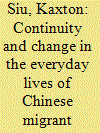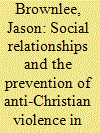| Srl | Item |
| 1 |
ID:
139847


|
|
|
|
|
| Summary/Abstract |
How have Chinese migrant workers’ patterns of everyday life changed over the past two decades, and what has not changed? Have their personal and career aspirations shifted over time? What changes have occurred in how they maintain social relationships within and across factories? What are the implications for migrant workers, local governance and factory managements? Based on workers’ letters and ethnographic research in Shenzhen, this article argues that migrant workers encounter very different circumstances today in their housing, food, time scheduling, aspirations and ways of maintaining social relationships. yet young migrant workers still invoke social relationships steeped in links to family and village to cope with daily difficulties. I examine the workers’ greater control over their time, local governments’ growing need to accommodate migrant workers’ requirements in order to maintain social stability, and the increasing pressure on factory managements to consider workers’ work/leisure arrangements, especially during peak industrial seasons.
|
|
|
|
|
|
|
|
|
|
|
|
|
|
|
|
| 2 |
ID:
157526


|
|
|
|
|
| Summary/Abstract |
Institutionalist accounts of sectarian and ethnic conflict tend to emphasize national divisions. For the "master cleavages" of identity politics to shape behavior, however, they must be reproduced at the local level. Otherwise, citizens will not experience private disagreements in terms of officially promoted differences. This finding comes from extensive fieldwork on collective assaults upon Christians in Qena, Egypt. The Egyptian state favors Muslim citizens over Christian citizens, but in Qena local practices eclipsed this national hierarchy. The likelihood of attacks on Christians depended not on how the state categorized Egyptian governors (Muslim or Christian), but whether the governors reproduced Muslim primacy in their social relationships.
|
|
|
|
|
|
|
|
|
|
|
|
|
|
|
|